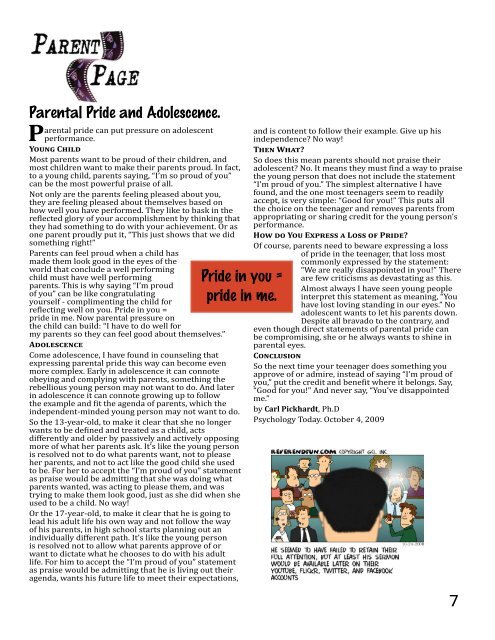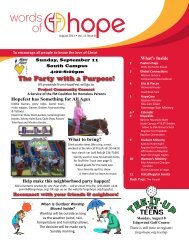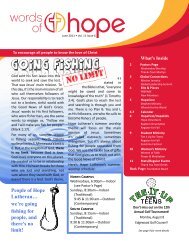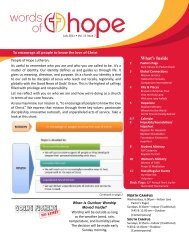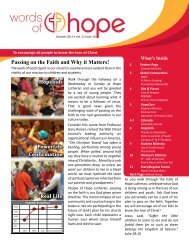Page 2 Page 4 Page 7 Page 6 - Hope Lutheran Church
Page 2 Page 4 Page 7 Page 6 - Hope Lutheran Church
Page 2 Page 4 Page 7 Page 6 - Hope Lutheran Church
You also want an ePaper? Increase the reach of your titles
YUMPU automatically turns print PDFs into web optimized ePapers that Google loves.
Parental Pride and Adolescence.<br />
Parental pride can put pressure on adolescent<br />
performance.<br />
Young Child<br />
Most parents want to be proud of their children, and<br />
most children want to make their parents proud. In fact,<br />
to a young child, parents saying, “I’m so proud of you”<br />
can be the most powerful praise of all.<br />
Not only are the parents feeling pleased about you,<br />
they are feeling pleased about themselves based on<br />
how well you have performed. They like to bask in the<br />
reflected glory of your accomplishment by thinking that<br />
they had something to do with your achievement. Or as<br />
one parent proudly put it, “This just shows that we did<br />
something right!”<br />
Parents can feel proud when a child has<br />
made them look good in the eyes of the<br />
world that conclude a well performing<br />
child must have well performing<br />
parents. This is why saying “I’m proud<br />
of you” can be like congratulating<br />
yourself - complimenting the child for<br />
reflecting well on you. Pride in you =<br />
pride in me. Now parental pressure on<br />
the child can build: “I have to do well for<br />
my parents so they can feel good about themselves.”<br />
Adolescence<br />
Come adolescence, I have found in counseling that<br />
expressing parental pride this way can become even<br />
more complex. Early in adolescence it can connote<br />
obeying and complying with parents, something the<br />
rebellious young person may not want to do. And later<br />
in adolescence it can connote growing up to follow<br />
the example and fit the agenda of parents, which the<br />
independent-minded young person may not want to do.<br />
So the 13-year-old, to make it clear that she no longer<br />
wants to be defined and treated as a child, acts<br />
differently and older by passively and actively opposing<br />
more of what her parents ask. It’s like the young person<br />
is resolved not to do what parents want, not to please<br />
her parents, and not to act like the good child she used<br />
to be. For her to accept the “I’m proud of you” statement<br />
as praise would be admitting that she was doing what<br />
parents wanted, was acting to please them, and was<br />
trying to make them look good, just as she did when she<br />
used to be a child. No way!<br />
Or the 17-year-old, to make it clear that he is going to<br />
lead his adult life his own way and not follow the way<br />
of his parents, in high school starts planning out an<br />
individually different path. It’s like the young person<br />
is resolved not to allow what parents approve of or<br />
want to dictate what he chooses to do with his adult<br />
life. For him to accept the “I’m proud of you” statement<br />
as praise would be admitting that he is living out their<br />
agenda, wants his future life to meet their expectations,<br />
Pride in you =<br />
pride in me.<br />
and is content to follow their example. Give up his<br />
independence? No way!<br />
Then What?<br />
So does this mean parents should not praise their<br />
adolescent? No. It means they must find a way to praise<br />
the young person that does not include the statement<br />
“I’m proud of you.” The simplest alternative I have<br />
found, and the one most teenagers seem to readily<br />
accept, is very simple: “Good for you!” This puts all<br />
the choice on the teenager and removes parents from<br />
appropriating or sharing credit for the young person’s<br />
performance.<br />
How do You Express a Loss of Pride?<br />
Of course, parents need to beware expressing a loss<br />
of pride in the teenager, that loss most<br />
commonly expressed by the statement:<br />
“We are really disappointed in you!” There<br />
are few criticisms as devastating as this.<br />
Almost always I have seen young people<br />
interpret this statement as meaning, “You<br />
have lost loving standing in our eyes.” No<br />
adolescent wants to let his parents down.<br />
Despite all bravado to the contrary, and<br />
even though direct statements of parental pride can<br />
be compromising, she or he always wants to shine in<br />
parental eyes.<br />
Conclusion<br />
So the next time your teenager does something you<br />
approve of or admire, instead of saying “I’m proud of<br />
you,” put the credit and benefit where it belongs. Say,<br />
“Good for you!” And never say, “You’ve disappointed<br />
me.”<br />
by Carl Pickhardt, Ph.D<br />
Psychology Today. October 4, 2009<br />
7


